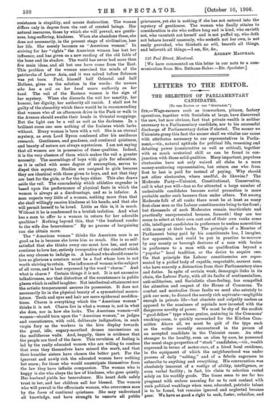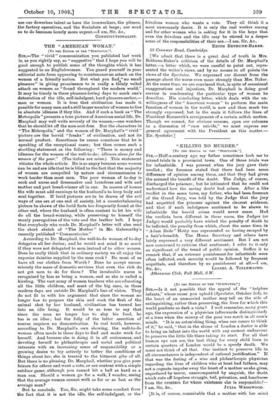LETTERS TO THE EDITOR.
THE SELECTION OF PARLIAMENTARY CANDIDATES.
[To THE EDITOR OF THE "SpEcTAros.1 SIR,—Wage-earners such as ironworkers, pitmen, factory operatives, together with Socialists at large, have discovered the new, but now obvious, fact that private wealth is neither necessary to a Parliamentary candidate, nor to his successful discharge of Parliamentary duties if elected. The sooner we Unionists grasp this fact the sooner shall we vitalise our cause with attributes necessary to our representatives in Parlia- ment,—viz., natural aptitude for political life, reasoning and debating power (constructive as well as critical), together with as much oratorical skill as can be found in con- junction with those solid qualities. Many important, populous electorates have not only waived all claim to a mere money-scattering representative, but return one who from first to last is paid for instead of paying. Why should not other electorates, where needful, do likewise.? The Moderate Party—Unionist, Constitutional, Conservative, call it what you will—has so far attracted a large number of undesirable candidates because social promotion is more probable under such banners than under others. Yet among Moderate folk of all ranks there must be at least as many first-class men as the Labour constituencies bring to the front ; but thousands of such Moderates remain inarticulate and practically unrepresented because, forsooth ! they are too mean to select at their own cost out of their own ranks some able, intelligent candidates in preference to useless nonentities with money at their backs. The principle of a Member of Parliament being paid by his constituents has, I imagine, few opponents, and could be put in practice to-morrow by any county or borough desirous of a man with brains in preference to a man with no qualification beyond a " popular " local tradition, or the desire to acquire one. On that principle the Labour constituencies are repre- sented by a picked body of capable, respectable, earnest men, who have scarcely a distraction from their Parliamentary aims and duties. In spite of certain weak, demagogic links in its chain, the Labour Party, with all its faults of sentimentalism, anti-militarism, and Socialistic class-feeling, has compelled the attention and respect of the House of Commons. To combat and neutralise those faults we need also astutely to pick our men; to discard the merely rich aspirants—negligible enough in private life—but obsolete and culpably useless as opposed to the nominees of myriads now invested with the dangerous novelty of power. We must be shy of the modish " good-fellow " type whose genius, maturing in the Commons' smoking-room, is quickly earmarked for the Kitchen Com- mittee. Above all, we must be quit of the type such as the writer recently encountered in the person of an accepted candidate in the Unionist cause. An utter stranger to the locality, even an alien by race, he possessed the usual stage-properties of "stock " candidates,—viz., wealth expressed in terms of motor-cars, of a hired local residence, in the equipment of which the neighbourhood was under process of daily "salting," and of a febrile eagerness to subscribe to anything and everything. His conversation was absolutely innocent of a vestige of ability, intelligence, or even verbal facility ; in fact, his claim to selection rested solely on his worldly goods. The times seem to me far too pregnant with serious meaning for us to rest content with such political weaklings when sane, educated, patriotic talent is to be found, but remains ignored and neglected because poor. We have as good a right to seek, foster, subsidise, and use our dowerless talent as have the ironworkers, the pitmen, the factory operatives, and the Socialists at large; our need so to do becomes hourly more urgent.—I am, Sir, &c.,
CONSTITIITIONALMT.















































 Previous page
Previous page